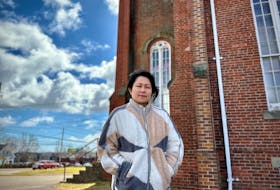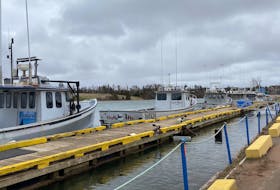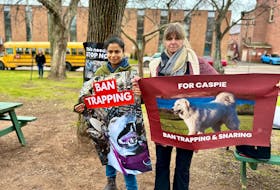A rising sea level caused by climate change will "hammer the hell" out of Prince Edward Island, said David Suzuki during a stop in the province Sunday.
The host of CBC's Nature of Things was at UPEI for an Atlantic Canada tour discussing the impacts of climate change in the coastal region and the catastrophic effects that will be felt from the rising ocean temperatures and extreme weather events.
Suzuki said areas of P.E.I. and other Atlantic provinces have already begun to feel impacts such as flooding and erosion.
Those will continue, he said.
"You're going to lose a huge amount of your shoreline, it's as simple as that," Suzuki said during an interview with The Guardian. "You're an Island, the ocean is all around you and when water warms, it expands.
"The sea level rise just from warming is going to hammer the hell out of this province."
While the evening saw a panel discussion with Suzuki, it also focused on a documentary premiere of the film Climate Change in Atlantic Canada, which tells the stories of those in the region who have already been affected.
Ian Mauro, a Canada Research Chair at Mount Allison and director of the film, said the 45-minute documentary took two years to make and involved interviewing more than 100 people across Atlantic Canada.
Mauro said the film aims to take the global knowledge of climate change and bring it down to a local scale, with case studies including both P.E.I.'s north and south shores.
"The farmers, the hunters, the fishers, they don't have an agenda. They are here telling us what they know from their experience and I think that has a tremendous amount of credibility, "said Mauro.
Don Jardine, an environmental consultant working with the UPEI Climate Lab, was a provincial representative for the project.
He said P.E.I. is the most vulnerable province to erosion and seeing the effects close to home makes people pay more attention.
"We're an island and our rock is not like the rock in Newfoundland, it's soft and easily eroded," he said. "The combination is causing more harm than what people are realizing."
Suzuki also spoke on the most recent Intergovernmental Panel on Climate Change report, which is more confident than ever that the burning of fossil fuels is one of the main causes of climate change.
Because of that, Suzuki said the main dilemma facing Canadians is the federal government's unwillingness to lean off fossil fuel production, which is a major part of the country's economy, and begin exploring alternative energy sources.
He said the "most important thing" Canadians can do to combat climate change is to vote out the government in the next federal election.
"The solution is very clear. Stop building these goddamn pipelines because we're going to have to leave that oil. Stop developing the tar sands," he said. "The problem we have is a government in Ottawa that for eight years now has denied the reality of climate change and done nothing.
"The reality is all hell is breaking loose and are we just going to make it worse by saying the economy comes before everything else?"
The screening at UPEI also saw proceeds going towards the Kensington North Watershed Association.
Barry Murray, executive director of the watershed, said the group will use the funds to create a provincial project involving all of the watershed groups.
He said that project may involve collecting natural type data in the province, such as migration dates, fishing patterns and other weather indicators.
"It's important for us to collect this data so we know how to prepare ourselves and adapt to our changing climate," he said. "In every issue that we deal with, climate change is there."
A rising sea level caused by climate change will "hammer the hell" out of Prince Edward Island, said David Suzuki during a stop in the province Sunday.
The host of CBC's Nature of Things was at UPEI for an Atlantic Canada tour discussing the impacts of climate change in the coastal region and the catastrophic effects that will be felt from the rising ocean temperatures and extreme weather events.
Suzuki said areas of P.E.I. and other Atlantic provinces have already begun to feel impacts such as flooding and erosion.
Those will continue, he said.
"You're going to lose a huge amount of your shoreline, it's as simple as that," Suzuki said during an interview with The Guardian. "You're an Island, the ocean is all around you and when water warms, it expands.
"The sea level rise just from warming is going to hammer the hell out of this province."
While the evening saw a panel discussion with Suzuki, it also focused on a documentary premiere of the film Climate Change in Atlantic Canada, which tells the stories of those in the region who have already been affected.
Ian Mauro, a Canada Research Chair at Mount Allison and director of the film, said the 45-minute documentary took two years to make and involved interviewing more than 100 people across Atlantic Canada.
Mauro said the film aims to take the global knowledge of climate change and bring it down to a local scale, with case studies including both P.E.I.'s north and south shores.
"The farmers, the hunters, the fishers, they don't have an agenda. They are here telling us what they know from their experience and I think that has a tremendous amount of credibility, "said Mauro.
Don Jardine, an environmental consultant working with the UPEI Climate Lab, was a provincial representative for the project.
He said P.E.I. is the most vulnerable province to erosion and seeing the effects close to home makes people pay more attention.
"We're an island and our rock is not like the rock in Newfoundland, it's soft and easily eroded," he said. "The combination is causing more harm than what people are realizing."
Suzuki also spoke on the most recent Intergovernmental Panel on Climate Change report, which is more confident than ever that the burning of fossil fuels is one of the main causes of climate change.
Because of that, Suzuki said the main dilemma facing Canadians is the federal government's unwillingness to lean off fossil fuel production, which is a major part of the country's economy, and begin exploring alternative energy sources.
He said the "most important thing" Canadians can do to combat climate change is to vote out the government in the next federal election.
"The solution is very clear. Stop building these goddamn pipelines because we're going to have to leave that oil. Stop developing the tar sands," he said. "The problem we have is a government in Ottawa that for eight years now has denied the reality of climate change and done nothing.
"The reality is all hell is breaking loose and are we just going to make it worse by saying the economy comes before everything else?"
The screening at UPEI also saw proceeds going towards the Kensington North Watershed Association.
Barry Murray, executive director of the watershed, said the group will use the funds to create a provincial project involving all of the watershed groups.
He said that project may involve collecting natural type data in the province, such as migration dates, fishing patterns and other weather indicators.
"It's important for us to collect this data so we know how to prepare ourselves and adapt to our changing climate," he said. "In every issue that we deal with, climate change is there."

![['Environmental activist David Suzuki was in Charlottetown Sunday to show his new documentary called Climate Change in Atlantic Canada. It was shown at UPEI. The documentary looks at the adverse affects of climate change and places like P.E.I that will be hard hit since it is an island. ']](https://saltwire.imgix.net/david-suzuki-2490995.jpg?cs=srgb&fit=crop&h=568&w=847&dpr=1&auto=enhance%2Cformat%2Ccompress)







